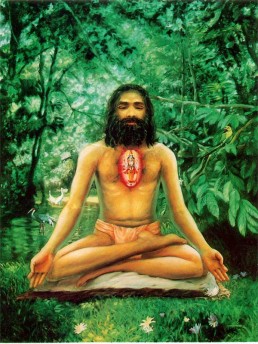Swami Chinmayananda Commentary
There is an ocean of difference between a modern man condemning the sacred scriptures of our land, and a true seeker questioning the same philosophy, in his honest attempt to understand the full import, the wealth of suggestiveness contained therein. In his acute awareness, Arjuna realises, deep within himself, his own subjective experience that a mind cannot be stilled — “as it is ever TURBULENT, STRONG and UNYIELDING.”
These three terms are quite pregnant in their own import. Turbulence shows not only the speed in the flow of thoughts but also their restlessness and agitations, causing undulating waves rising on the surface. Not only does the flood of thoughts flow fast and rough, but having reached its destination at some sense-object or the other, it gets so powerfully attached to it, that it becomes strong in its new roots. Mind in turbulence is, no doubt, difficult to arrest; when it gets strongly rivetted, it is difficult to pluck it away from its attachments. And the third characteristic feature of the mind is that, when it has flown into any new channel of its own choice, for the moment, it is “unyielding”; and so it is impossible for the individual to pull it back from its flight and persuade it to stay at any chosen point-of-concentration. It is to be remembered that this was the technique advised by Krishna for the practice of meditation earlier in this chapter (VI-26). The strength and vigour, the vivacity and treachery, the penetrativeness and all-pervasiveness of the mind, cannot be better expressed than by the simile given here “AS THE WIND.” In raising this question, Arjuna is asking Krishna for some practical tips by which he can gain perfect control over the stormy nature of “the unyielding, strong, turbulent and restless mind.” Herein, unlike the previous stanza, the Lord is addressed by His most familiar name ‘Krishna’; a word that comes from the root Krisha — ” to scrape.” The term “Krishna” is applicable to the Self because, on realisation of the Truth, the threats of the delusory mind and the consequent dreamy vasanas will all be scraped away from our cognition.
The bloody hands of the dreamer get automatically cleaned and all the moral stigma attached to the murder immediately gets cleared, when the dreamer wakes up. Similarly, the mind and its onslaughts, its vasanas and their tyranny, the intellect and its quest, the physical body and its appetites… all, all end with the rediscovery of the true nature of the Self. Therefore the poet-philosopher Vyasa, in his immortal classic, Mahabharata, paints the inner Self as Lord “Krishna,” the Flute-player of Vrindavana. In Sanskrit, this is a special art, unknown to any other language in the world: the coining of a proper noun for a person to indicate the peculiar quality that is to be suggested in the context of the narration.
ACCEPTING THE ARGUMENTS OF ARJUNA, THE LORD ANSWERS THAT THERE IS A METHOD BY WHICH THE INVINCIBLE MIND CAN BE BROUGHT UNDER CONTROL:
Adi Sankara Commentary
Mahabaho, O mighty-armed one; asamsayam, undoubtedly-there is no doubt with regard to this; that the manah, mind; is durnigraham, untractable; and calm, restless. Tu, but; it-the modifications of the mind in the form of distractions-grhyate, is brought under control; abhyasena, through practice- abhyasa means repetition of some idea or thought of the mind one some mental plane [‘Some mental plane’ suggests some object of concentration.]-; and vairagyena, through detachment-vairagya means absence of hankering for enjoyment of desirable things, seen or unseen, as a result of the practice of discerning their defect. That mind is thus brought undr control, restrained, i.e. completely subdued. By him, however, who has not controlled his mind-
The Bhagavad Gita with the commentary of Sri Sankaracharya – Translated by Alladi Mahadeva Sastry
Holy Geeta – Commentary by Swami Chinmayananda
The Bhagavad Gita by Eknath Easwaran – Best selling translation of the Bhagavad Gita
The Bhagavad Gita – Translation and Commentary by Swami Sivananda
Bhagavad Gita – Translation and Commentary by Bhaktivedanta Swami Prabupadha
Srimad Bhagavad Gita Chapter 6 – Verse 34 – 6.34 cancalam hi – All Bhagavad Gita (Geeta) Verses in Sanskrit, English, Transliteration, Word Meaning, Translation, Audio, Shankara Bhashya, Adi Sankaracharya Commentary and Links to Videos by Swami Chinmayananda and others – 6-34

